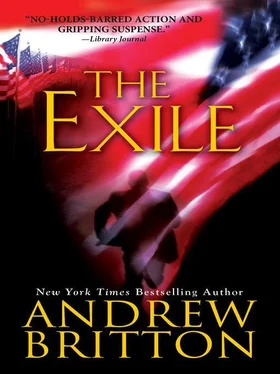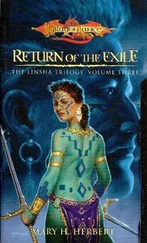Andrew Britton - The Exile
Здесь есть возможность читать онлайн «Andrew Britton - The Exile» весь текст электронной книги совершенно бесплатно (целиком полную версию без сокращений). В некоторых случаях можно слушать аудио, скачать через торрент в формате fb2 и присутствует краткое содержание. Жанр: Триллер, на английском языке. Описание произведения, (предисловие) а так же отзывы посетителей доступны на портале библиотеки ЛибКат.
- Название:The Exile
- Автор:
- Жанр:
- Год:неизвестен
- ISBN:нет данных
- Рейтинг книги:5 / 5. Голосов: 1
-
Избранное:Добавить в избранное
- Отзывы:
-
Ваша оценка:
- 100
- 1
- 2
- 3
- 4
- 5
The Exile: краткое содержание, описание и аннотация
Предлагаем к чтению аннотацию, описание, краткое содержание или предисловие (зависит от того, что написал сам автор книги «The Exile»). Если вы не нашли необходимую информацию о книге — напишите в комментариях, мы постараемся отыскать её.
The Exile — читать онлайн бесплатно полную книгу (весь текст) целиком
Ниже представлен текст книги, разбитый по страницам. Система сохранения места последней прочитанной страницы, позволяет с удобством читать онлайн бесплатно книгу «The Exile», без необходимости каждый раз заново искать на чём Вы остановились. Поставьте закладку, и сможете в любой момент перейти на страницу, на которой закончили чтение.
Интервал:
Закладка:
Catching himself, he grimaced and shifted his eyes away from the window. He did not want to dwell on the past. It had no bearing on what he was doing now, and besides, he was not the same man he had been back then. He had been immature and ill equipped for the work he was tasked with, but those days were over. Ironically, his work with the State Department-which was meant to be more of a punishment than anything else-had provided him with many of the skills he’d lacked as a young operations officer with the CIA.
The three years he’d spent in Jordan had given him rudimentary Arabic, which he later improved on, and an endless stream of embassy functions in half a dozen countries throughout Africa and the Middle East had taught him about the dark side of diplomacy. He’d learned how to spot the intelligence officers posing as minor functionaries, and an interview with a stunning female reporter from Khoa Ditore — a supposedly independent newspaper in Kosovo-had shown him just how far the host government was sometimes willing to go to recruit a source, even someone as lowly placed as himself. He could still picture the reporter’s silky black hair, blood-red lips and full, perfectly formed breasts. He remembered the way she had leaned forward to give him a glimpse of her cleavage, the smell of her perfume as she whispered her proposition an inch from his ear.
White had possessed photographic recall since he was a child, and even now, eight years later, the memory was still enough to bring about a physical reaction. And that was the memory alone; confronted with the real thing, he had not been able to resist the temptation. He had told her what she wanted to know, and she had rewarded him with the best sex of his life, right there on the ratty couch in his small corner office.
The memory brought a smile to his face. White still wondered how she might have reacted when she learned that he’d made it all up, but he didn’t feel the slightest bit of guilt. She had tried to manipulate him, and he had simply reversed the process. That was the name of the game. It was also the most important thing he’d learned during his time overseas-namely, how to manipulate people. He’d learned how to determine what they wanted, which told him in turn how to get what he wanted. The trick, he’d discovered, was simply listening. Listening to their problems, hopes, fears, and desires. It was amazing what people would say when given the chance, even at an embassy function, where they were surrounded by their countrymen and more than a few of their own intelligence officers, many of whom would gladly kill the loose-lipped official for speaking out of turn.
Cullen White had quickly seen the value of his ability to draw people in and secure their trust, even if he didn’t understand where it came from, and he’d done his best to use it to his advantage. At first, he had passed everything on to the CIA, mainly because he didn’t see any alternative. That was back when he still believed in the possibility of redemption. Later, when he realized they would never take him back, he still took notes and retained what he knew, but he no longer shared his insider knowledge…at least not until his posting to Liberia.
That was when he had first met Joel Stralen, the man who had vowed to help resurrect White’s moribund career. He was one of the few men with the power not only to make that kind of promise but to actually follow through on it. And in the years that followed, he proved true to his word.
Although it had been a decade since their first encounter, White could remember that meeting in its entirety. At the time, Stralen was a brigadier general in the DIA and the commander of the Directorate for Human Intelligence. As such, he was the primary liaison between the DIA and the CIA, as well as the head of the Defense Attache System, the DOD program that provides military and civilian attaches to hundreds of offices around the world. White had been getting ready to leave for the day when he turned to find the general standing in the doorway to his tiny office. Stralen quietly asked him for a few minutes of his time, and White, assuming he’d done something wrong, reluctantly agreed. Five minutes later, over stale coffee in the ground-floor cafeteria, he learned the real reason for Stralen’s visit.
It was the fall of 2000, and the UN Security Council was a body divided. Three of the permanent members-the Americans, the French, and the British-were in favor of imposing limited sanctions on the Republic of Liberia, while the other two-the Chinese and the Russians-were opposed. A similar measure had already been passed with respect to Sierra Leone. Security Council Resolution 1806 had placed an eighteen-month restriction on the export of so-called “blood diamonds” from the West African nation, the site of a decade-long civil war between the sitting government and the Revolutionary United Front. The RUF was a powerful dissident group funded primarily through the sale of black-market diamonds in Western Europe. Those sales were worth an
incalculable fortune each year, proceeds that were naturally used to purchase small arms for the estimated 25,000 members of the RUF.
The Security Council had seen evidence linking Liberian president Charles Taylor to key members of the RUF, and it was believed that Taylor was taking a cut of the profits in exchange for funneling the diamonds safely through Liberia to the waiting markets in London, Antwerp, and Prague. Before the Security Council was willing to move, though, it wanted hard evidence in the form of an eyewitness. Preferably someone in the Liberian government, a politician of note who could conclusively tie Taylor to the RUF. Stralen believed that the man they were looking for was the Liberian finance minister, Thomas R. Craven. In his opinion, Craven was the weakest link in the chain, and he wanted White to offer the minister immunity, asylum in the United States, and one million dollars in exchange for his testimony before the Security Council.
White had not felt the need to point out the gross illegality of Stralen’s proposal, as it was plain enough to both of them. If the terms of the offer ever came to light, the U.S. government would soon find itself embroiled in a scandal of unprecedented scale. The dangers involved were very real and hard to ignore. At the same time, purchasing testimony from a foreign diplomat was not something easily done, and despite his misgivings, White was secretly flattered that the general had seen fit to entrust him with such a delicate task. More importantly, he sensed that Stralen was sizing him up for something more, and that was enough to seal his decision. He agreed to help, and one week later he attended a function at the presidential palace in Monrovia. Thomas Craven was also in attendance, and White, having already met and talked to the man on several prior occasions, managed to corner him long enough to relay the offer.
Incredibly, Craven had agreed on the spot. Later White learned that the minister had been on the verge of dismissal, anyway, and was only too happy to have the opportunity to turn the tables on Charles Taylor.
As it turned out, he never got the chance. The UN decided to move forward without Craven’s testimony, and Stralen’s offer was quietly rescinded. It was easily done; there was nothing on paper, and Craven could hardly go public, as that would have exposed his own treachery to Taylor, who was still in power. But the fact that White had succeeded in his task was not in dispute, and Joel Stralen-never one to forget a favor-showed his appreciation by offering him a unique, secret position in the DIA.
A week after the UN announced its decision to proceed with the sanctions in Liberia, they discussed the terms over lunch in a Monrovia hotel, with two of the general’s men standing guard outside the door. Stralen envisioned him as a troubleshooter of sorts, as opposed to a full-time civilian employee, and White felt the same way. The offer came with just one caveat. Owing to his previous position with the CIA, which even then Stralen regarded as a rival agency, White would not be permitted to publicly acknowledge his new role with the Department of Defense.
Читать дальшеИнтервал:
Закладка:
Похожие книги на «The Exile»
Представляем Вашему вниманию похожие книги на «The Exile» списком для выбора. Мы отобрали схожую по названию и смыслу литературу в надежде предоставить читателям больше вариантов отыскать новые, интересные, ещё непрочитанные произведения.
Обсуждение, отзывы о книге «The Exile» и просто собственные мнения читателей. Оставьте ваши комментарии, напишите, что Вы думаете о произведении, его смысле или главных героях. Укажите что конкретно понравилось, а что нет, и почему Вы так считаете.










